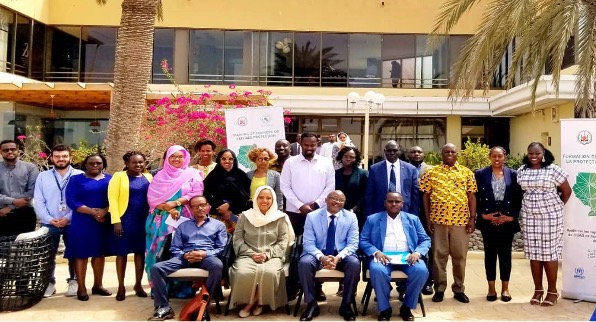June 11, 2022 (DJIBOUTI, Djibouti): The Intergovernmental Authority on Development (IGAD) with the technical support of the United Nations High Commissioner for Refugees (UNHCR) and the financial support from the Government of Sweden, through the Swedish International Development Cooperation Agency (SIDA) convened a Regional Training of Trainers (ToT) on refugee protection in Djibouti on June 6 and 7.
Twenty-one experts on Refugee Protection from the national refugee management agencies from Djibouti, Ethiopia, Kenya, Somalia, South Sudan, Sudan, and Uganda attended the four-day workshop facilitated by subject specialists from the Nairobi-based UNHCR Regional Bureau for the East and Horn of Africa.

The training was aimed at strengthening Member States’ refugee management agencies capacities, enhancing knowledge transfer within the national operations, and harmonising refugee protection practices across the region through specialised training sessions. The sessions covered four thematic areas identified by the Member States as priorities in their operations; International legal framework and the regional mechanisms on refugee protection, Access to territory, reception, registration, and documentation, Access to fair and efficient asylum procedures, and the Global Compact on Refugees and its Comprehensive Response Refugee Framework.
At the opening ceremony, on behalf of the IGAD Executive Secretary, the Director for Health and Social Development Division, Mme Fathia Alwan, stated that the IGAD region hosted one of the highest concentrations of displaced persons in Africa. By the end of 2021 the region was the home to over 4 million refugees and asylum seekers, and 9 million IDPS. She advocated for a regional approach to refugee protection based on an inclusive application of the international refugee protection principles to complement Member States’ initiatives, improve countries of asylum conditions, and reduce refugees’ secondary movements. The Director also expressed her sincere appreciation to UNHCR for the technical support in facilitating the workshop, the Government of Sweden for the financial support and the Government Djibouti for hosting the workshop and continued cooperation.

“Many displaced populations also remain in protracted situations and have found it difficult to break free from the cycle of dependence on humanitarian assistance and achieve sustainable solutions”, Mme Fathia Alwan said.
In his welcoming remarks on behalf of the UNHCR Regional Bureau for the East and Horn of Africa and the Great Lakes Region, Mr. Yohondamkoul Sakor, UNHCR’s Representative in Djibouti commended the use of IGAD’s convening platforms in addressing displacement and other social issues, that in turn strengthened refugee protection across the region. On continued collaboration between the two institutions, the Representative stated: “UNHCR is therefore extremely pleased to provide support towards this important and timely regional training initiative that is an opportune response to the request for capacity building received from member states.”
The workshop was opened by the Secretary-General of the Ministry of Interior, Mr. Sirag Omar Abdoulkader, who requested the participants to focus on access to fair and efficient asylum procedures and the various bottlenecks in the frameworks of the refugee eligibility procedures. He also invited all the participants for a field visit at Djibouti’s L’Office National d’Assistance aux Refugies et Sinistres (ONARS) to observe Policy implementation as part of the training.
In addition to working towards harmonising approaches on refugee protection, capacity building of the national refugee protection agencies, and building a pool of competent instructors within the refugee protection agencies for knowledge transfer in the Member States, the experts developed a Call for Recommendations in relation to international protection in the region. Here is the detailed Call for Recommendations developed and adopted by the experts at the end of the ToT.

Download Attachment below: